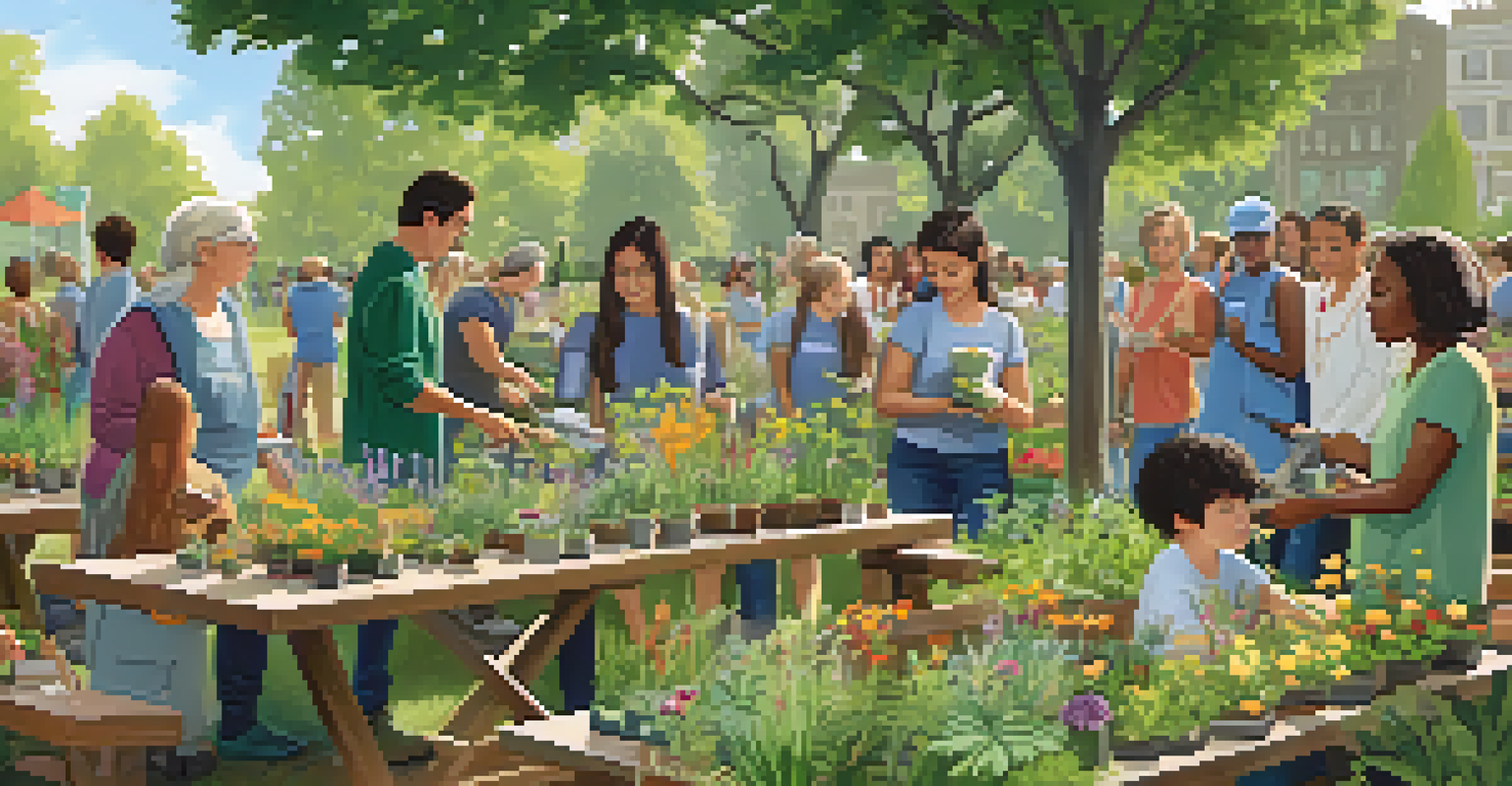The Role of Parks in Community Building in Atlanta

Parks as Gathering Spaces for Atlanta Residents
Parks serve as vital gathering spaces for residents in Atlanta, allowing people from diverse backgrounds to come together. Whether it's a local music festival, a farmers market, or simply a picnic, these green spaces encourage community interaction. For instance, Piedmont Park hosts many events that attract thousands, showcasing the city's vibrant culture.
Parks are not just green spaces; they are the heart of our communities, bringing people together and fostering connections.
These gatherings often spark conversations and connections that might not happen in other settings. They create a sense of belonging and foster friendships, which are essential for a healthy community. The relaxed atmosphere of a park makes it easier for strangers to become friends.
Moreover, parks are accessible to everyone, regardless of age or economic background. This inclusivity promotes unity and strengthens community ties, making parks essential to Atlanta's social fabric.
Promoting Health and Well-Being Through Parks
Parks in Atlanta play a significant role in promoting the physical and mental well-being of residents. With ample space for walking, jogging, and biking, they encourage an active lifestyle that can lead to improved health. For example, the Atlanta BeltLine offers miles of trails that not only connect parks but also serve as a fitness hub for the community.

Being in nature has been shown to reduce stress and improve mood, providing a sanctuary from the hustle and bustle of city life. Parks give residents a chance to unwind, breathe fresh air, and engage in recreational activities. The tranquility of a park can have a refreshing impact on mental health.
Parks Foster Community Connections
Parks in Atlanta serve as vital gathering spaces that promote interaction and friendships among residents from diverse backgrounds.
Furthermore, community programs often take place in these parks, offering fitness classes and wellness workshops. These initiatives not only promote health but also bring people together in a supportive environment, emphasizing the parks' role in fostering community well-being.
Parks as Educational Resources for Local Communities
Atlanta's parks serve as outdoor classrooms, providing educational opportunities for community members of all ages. Many parks offer programs that teach about local wildlife, ecology, and sustainability. The Atlanta Botanical Garden, for instance, hosts workshops that engage the community in learning about horticulture and conservation.
In every walk with nature, one receives far more than he seeks.
These educational initiatives foster a sense of stewardship for the environment, encouraging residents to take pride in their community. When people learn about the importance of preserving green spaces, they are more likely to engage in conservation efforts. This knowledge-sharing creates a well-informed community that cares for its surroundings.
Additionally, schools often utilize parks for field trips, helping students connect classroom learning with real-world experiences. This not only enriches their education but also strengthens the bond between schools and the community.
Environmental Benefits of Urban Parks in Atlanta
Urban parks contribute significantly to the environment, improving air quality and providing habitats for wildlife. In a bustling city like Atlanta, these green spaces act as crucial lungs, absorbing carbon dioxide and releasing oxygen. Trees planted in parks also help combat urban heat, making neighborhoods more livable.
Moreover, parks play a role in managing stormwater runoff, which can be a challenge in urban areas. By allowing rainwater to seep into the ground, they reduce flooding and protect local waterways. This natural filtration system is vital for maintaining the health of the city's ecosystem.
Parks Enhance Health and Wellness
With opportunities for physical activity and relaxation, Atlanta's parks significantly contribute to the physical and mental well-being of the community.
As more residents become aware of these environmental benefits, they are more inclined to support park conservation efforts. This creates a community that values its green spaces, understanding that they are not just for recreation but essential for a sustainable future.
Fostering Civic Engagement and Volunteerism
Parks in Atlanta serve as a catalyst for civic engagement and volunteer efforts within the community. Local residents often come together to participate in clean-up days, tree-planting events, and maintenance activities. These initiatives not only enhance the parks but also build a sense of ownership and pride among participants.
By volunteering in their parks, community members can see the results of their efforts firsthand, strengthening their connection to the space. This engagement often leads to deeper involvement in other community initiatives, fostering a culture of active citizenship. When people invest their time in their surroundings, they are more likely to advocate for improvements and participate in local governance.
Furthermore, parks provide a platform for residents to voice their opinions about community issues. Public meetings or forums held in these spaces encourage discussions about local needs and priorities, leading to a more engaged and informed community.
Enhancing Cultural Identity Through Parks
Parks in Atlanta reflect the city’s rich cultural heritage and diversity, making them essential for community identity. They often host cultural events that celebrate the traditions and histories of various communities, such as music festivals, art shows, and food fairs. These events create opportunities for cultural exchange and appreciation among residents.
Moreover, parks often feature public art installations that tell the stories of local communities. Murals, sculptures, and performance spaces not only beautify the area but also serve as a canvas for local artists to express their cultural narratives. This artistic representation fosters a sense of pride and belonging among residents.
Parks Drive Local Economic Growth
Well-maintained parks not only increase property values but also stimulate local businesses and tourism, driving economic growth in Atlanta.
By highlighting and celebrating the diverse cultural fabric of Atlanta, parks serve as a unifying force, helping to bridge gaps between different communities. They remind us that while our backgrounds may differ, we can come together to appreciate and celebrate our shared space.
Parks as Economic Drivers for Local Communities
Parks also play a crucial role in driving economic growth for local communities in Atlanta. Well-maintained parks enhance property values and attract new residents, contributing to a thriving local economy. Areas surrounding popular parks often see an increase in businesses, from cafes to boutiques, creating job opportunities.
The influx of visitors to parks for events and recreational activities also stimulates local spending. Restaurants and shops near parks often benefit from the increased foot traffic, leading to a more vibrant economic environment. This symbiotic relationship between parks and the local economy is crucial for sustainable development.

As such, investing in parks is not just about maintaining green spaces; it's about fostering economic resilience in the community. Cities that prioritize their parks often see a return on investment through increased tourism, enhanced community pride, and stronger local economies.